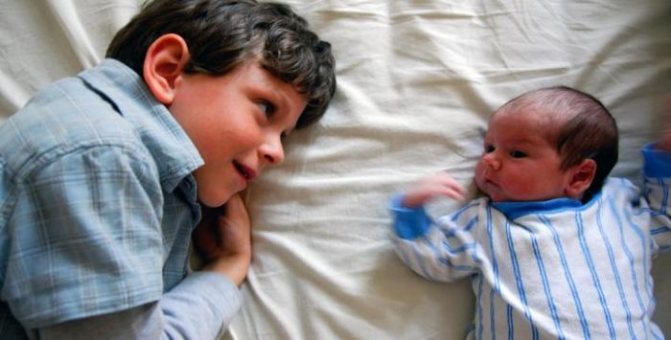The older baby begins to feel jealous of the younger child almost from the first day of his appearance after being discharged from the hospital. And this despite the fact that during pregnancy, children most often look forward to the appearance of a brother or sister.
Children's jealousy is not unnatural, it is caused by the fear of losing the love of mom and dad. Therefore, the older child may openly demonstrate a negative attitude towards the baby.
It is important for parents to choose the right behavior strategy so that their firstborn does not feel lonely. We suggest using recommendations that will help in this or that problematic situation.
Childhood jealousy depends on the gender of the child. Girls have a subconscious need to take care of their younger ones. Therefore, it is easier to captivate them with requests to care for the baby and smooth out jealous feelings. In boys, jealousy is more pronounced, and they are not always ready to help care for the child.
Situation No. 10: the older child “falls” into childhood
First-born children often begin to openly demand the same attention as a younger child: they ask to be picked up, fed, dressed, carried. It is impossible to ignore these requests, but it is also wrong to fully satisfy them. Look for the “golden” mean: if possible, sit the child on your lap, lift him up the stairs in your arms, lay him down, tell him a fairy tale. After a while, the older child will understand that his mother loves him as before.
If a woman cannot recover for a long time after childbirth, it will be more difficult for her firstborn to cope with jealousy. He may feel negative towards the baby because the mother feels bad precisely because of the newborn.
Causes of childhood jealousy
When a parent's first child is born, he receives maximum attention and care from adults: they devote a lot of time to him, play with him, and constantly listen to his requests and concerns. And then the baby finds out that he will have a brother or sister. Some children sincerely rejoice at the opportunity to have an ally in games and mischief, others perceive such news differently.
Often the older child believes that now he will be given less time, and this is true: now he will have to divide the attention of adults between himself and the new family member. Since at first the baby will constantly demand attention from the mother, the older child may begin to consider himself abandoned, less loved. Explaining that a younger brother or sister needs parental involvement now is simply vital will not always work.
It is important to understand that jealousy is neither good nor bad. This is an emotion that every person encounters at least once, so you can’t scold your baby for experiencing it.
Absolutely every child is a little selfish, and it’s good if he shows it. The situation is more complicated when the eldest son or daughter silently feels resentment and does not tell adults about their internal torment. It is important to talk with children and encourage them to sincerely share their experiences. It is better to start preparing the older child for joining the family even before the youngest is born.
Advice from a psychologist: what to do with childhood jealousy
Like any negative feeling, childhood jealousy needs a counterbalance in the form of positive emotions from other people. The further psycho-emotional state of children depends on the competent reaction of parents.
You should not fight childhood jealousy in radical ways. The peculiarity of the feeling is that it is completely impossible to eliminate it. But it is possible and necessary to reduce the severity of the manifestations.
Teachers and psychologists advise using some recommendations.
Often parents are not prepared for their child’s jealousy and do not know how to control his emotions. It is important to understand that jealousy is a natural feeling that should be responded to appropriately.
The first step in the manifestation of aggression is a confidential conversation. It is important to reassure the baby and try to convey to him that aggression does not lead to anything good, mom and dad love him equally much and will always love him.
At the second stage, tactile interactions should be connected. It has been proven that a person needs to receive up to 8 hugs a day. By hugging their baby and telling them that they are an important part of the family, parents are laying a strong foundation of love.
The third stage involves interaction with grandparents. Their calm and friendly attitude will help the baby feel important. But you should not give your child away for a long time, as he may realize that he is isolated from home. You can distribute responsibilities: while the mother walks with the youngest, the eldest reads or draws with the grandmother.
Preventing childhood jealousy is much easier than fighting it. It is important for parents to be united in trying to guide their little fidget on the right path. Since it depends only on their attitude what the child’s jealousy will develop into - it will take the form of healthy rivalry or enmity.
If a new addition is expected to the family
- Show the firstborn that there are many families where a second child is born. To do this, it is recommended to visit friends and unobtrusively show good relationships between older and younger children.
- The best way to calmly approach the birth of a second baby is not always the question “Do you want a brother or sister?” Often they are not ready for such a turn of events or do not fully understand the meaning of such a question.
- If the first-born has always slept in the parent's bed, then he should be taught to sleep in another place immediately after the parents find out about the second pregnancy. It is advisable not to combine these two events.
- The best way to prevent childhood jealousy is to bring the older child closer to his father. This way, the mother will not have to overload herself with unnecessary care for other family members in the future.
- When expecting the birth of your second baby, it is important to tell your eldest about how they were waiting for his birth at one time. Children's photos together, videos - all this sets up positive emotions associated with the family.
When a newborn appeared in the house
- When leaving for the maternity hospital, the mother must entrust the father with full care and custody of the eldest son so that he does not feel an acute lack of maternal love.
- When visiting new parents, guests shower the newborn with gifts and forget about the older child. It is worth asking them for a small present for the first-born.
- You should not tell your first child that he is already an adult and responsible for many of his actions.
- Tactile sensations are important for babies: hugs, kisses, stroking. While the younger one is sleeping, you can play with the older one or watch cartoons while cuddling.
- You should not compare two children with each other. These are individuals with different characters and destinies. Constant comparison can only provoke a situation where the older child is jealous of the younger one.
If the children are already grown up
- If quarrels arise between children, you should play the role of mediator. It is important to let the older and younger speak, and then end the conversation with a ritual of reconciliation.
- Parents should be a symbol of justice for both children.
- When going to the store, it is important to pay attention to each child and not deprive anyone of the purchase.
- By constantly comparing children, parents provoke jealous behavior.
- Protecting only the younger during quarrels forces the older to take a defensive position. It is important to stand up for your first-born, so that both will develop a sense of justice in the future.

When the feeling is directed towards dad
- Make it clear that the man occupies an important place in the family, and the mother loves each of them equally.
- If dad sees that the child has a negative attitude towards him because he is jealous, he should not move away. Hugs, conversations, walks together, bedtime stories - all this contributes to emotional closeness between family members.
- Parents can agree that once or twice a week only dad spends time with his offspring. A trip to the cinema, a park, or just a walk together will help you understand that dad is not a “border” between him and mom.
- If a young family member often makes complaints about dad or shows other negative emotions, he should be listened to and not ignored.
- Various joint games will unite all family members and give the baby the opportunity to forget about his jealousy.
Relevant products in the Online store:
Clinique
Clinique iD™ Active concentrate that evens out skin tone (must be supplemented with base)
from 900 rub.
Clinique
Clinique iD™ Dramatically Different™ Hydrating Jelly Unique moisturizing jelly (base - must be supplemented with concentrate)
from RUB 2,152
Clinique
Clinique iD™ Active concentrate against signs of fatigue on the face (must be supplemented with a base)
from 900 rub.
Clinique
Clinique iD™ BB-Gel Moisturizing BB gel that corrects skin tone
from RUB 2,152
All goods
Why does jealousy arise?
Basically, this situation occurs in families where the husband works, and the wife stays at home with the child (most families!), and the child sees his father, at best, for several hours in the evenings on weekdays and spends time alone with his dad only on weekends.
The child develops a strong attachment to his mother, because she is his source of life and security, and a strong feeling of anxiety if someone (as it seems to him) is trying to remove his mother from him. The baby begins to fear that his mother no longer needs him, that she no longer loves him.
At the age of 3 years, a child cannot yet control and share his feelings. Even if he misses his dad when he is away and rejoices at his coming, behaves wonderfully alone with his dad, plays happily and does not remember his mother at all, then all this WILL NOT HELP him overcome his anger and fear if he feels jealous towards dad.
At this age, it is completely pointless to expect that a child will suddenly remember that dad is his friend, that he loves him, that he is good and cannot be beaten: at an early age, a child is simply not able to simultaneously balance love and jealousy for dad!
What to do if an older child is jealous of a younger one
Despite all preventive measures, it will not be possible to completely avoid manifestations of jealousy. Therefore, it is very important to respond correctly to feelings that appear for the first time. In most cases, children's jealousy comes as a surprise to parents.
It is important not to react too violently; you should not scold or punish the child either. Jealousy is one of the natural feelings; you need to help the baby cope with it, reduce possible negative consequences, and ensure the safety of the youngest child as much as possible.
The first thing to do is recognize the problem. A big mistake parents make when giving birth to a second child is ignoring the feelings of the first-born, which leads to a worsening situation. You also cannot forbid a child to be jealous - he will continue to feel, but he will not be able to cope with his emotions alone.
As a result, the baby will constantly feel awkward and ashamed, which will lead to the development of various complexes. Only with the right approach and the help of parents will a child learn to cope with feelings, express them correctly, and manage emotions.
What needs to be done to achieve this goal

If a child is jealous, the advice of a psychologist will help cope with the situation.
- Show love. A child should not only know and hear that he is loved, but also feel it. During the day, you need to hug him, stroke him, touch him, kiss him before going to bed and after waking up.
- Spend time. There should be time during the day dedicated only to the firstborn. Otherwise, the baby will count how much time the “competitor” took, and will be indignant if the score turns out to be in favor of the newborn.
- Preserve the usual way of life and previously established “rituals” as much as possible. With the birth of another child, your daily routine inevitably changes. But this should affect the firstborn to a lesser extent.
- Have a conversation. During a heart-to-heart conversation, you need to explain to the baby what he feels, that this is normal. Agree that the child learns to express his emotions, say that the first-born should speak up if he feels insulted or unfair. The conversation should be soft. Most likely, more than one conversation will be needed.
- Do not try to appease your child with gifts and permissiveness. Otherwise it will lead to manipulative behavior.
- Think about joint leisure activities when all family members will be involved.
- Encourage correct behavior , for example, praise, contact.
Jealousy between children is common. It is important to teach kids to cope with this feeling without harming themselves and others.
When a child’s jealousy arises - the reasons why children begin to be jealous of their mother towards others
A child begins to be jealous very early. Most often, the first such reaction appears at 10 months . Already at this age, it is clear that the baby does not like it when the mother devotes time not to him, but to anyone else.
At the age of one and a half years the situation worsens. During this period, the baby feels like an owner - mom, dad and any other family member. A similar attitude extends to things: toys, clothes, your spoon.
Closer to two years, the child is already able to control his emotions, in particular, jealousy. However, this is not a reason to rejoice. On the contrary, by hiding his feelings deep in his soul, the baby harms his psyche.
The most dangerous period is the age from two to five years . Usually, at this time, the baby most painfully perceives any manifestation of care and love from the mother, which was not directed in his direction.
Despite individual differences, there are several main reasons why children are jealous of their mother.
- Birth of a baby . Most often, this becomes a problem when the baby was not prepared for this in advance. The sooner he learns that a new addition is planned to the family, the sooner he will get used to this idea and begin to take an active part in the preparations: choosing a name, buying a crib and stroller, arranging the nursery.
- New husband . Very often in such situations, children are jealous of their mother. Therefore, it is important to introduce the baby to the new family member in advance. But even in this case, there is no guarantee that their relationship will work out.
- Rivalry . Everyone loves to be praised and complimented. It is especially important for children to hear that they are the best. That is why, if another baby appears on the horizon for the parents - a son, daughter, nephews, neighbor's children - the child begins to think that these children will be more important to his mother and father.
The most important thing in solving this problem is calm and patience.
Attention!
Under no circumstances should you raise your voice at the baby or use physical force!
You can deal with childhood jealousy on your own. However, if the situation has already gone far and your own methods do not work, you need to seek help from a specialist.
There is no need to be afraid to take your child to a psychologist . Going to the doctor does not mean mental problems. On the contrary, this indicates that the parents perceive the situation sensibly and want to help their child.












